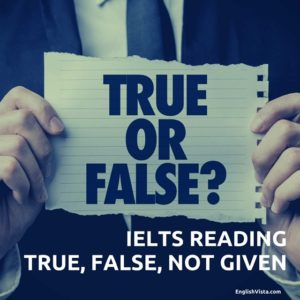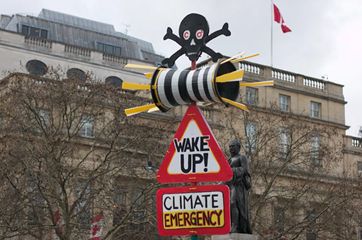
One common task in the IELTS Reading test is the True, False, Not Given exercise. In this task, you must read a passage of text and respond to a set of statements to say whether they are True, False or Not Given based on the information you have read in the passage.
It is essential to remember, in this type of exercise, that you shouldn’t be using your general knowledge or opinions. Instead, all of your answers should be based on the information in the passage.
To help you to prepare for this type of exercise, try out the practise exercise below. Read the passage, decide whether each statement is True (T), False (F), or Not Given (NG) and then check your answers.
Simple explanations to answers have been given to help your understanding. If you are preparing for the IELTS reading test, we recommend that you try this exercise out to improve your reading skills.
One top tip for this exercise is to remember that you only give the response False if the statement is actually incorrect. If the information is just not included, remember to answer with Not Given.
Exercise 1: Greta Thunberg

Reading Passage
Greta Thunberg is a Swedish climate youth activist who sparked an international movement to fight climate change beginning in 2018. With the simple message “School strike for climate” handwritten on poster board, Thunberg began skipping school on Fridays and protesting outside the Swedish Parliament. Thanks to social media, her actions have spread and influenced millions of young people all over the world to organise and protest.
Launching “Fridays For Future,” Thunberg and other concerned youths throughout Europe have continued to pressure leaders and lawmakers to act on climate change through their regular walkouts.
Thunberg has also travelled the world, meeting with global leaders and speaking at assemblies to demand climate solutions and a recommitment to the Paris Agreement. Recently diagnosed with Asperger’s, the activist has publicly shared her views on her disorder, referring to it as her “superpower.” In 2019, she was nominated for the Nobel Peace Prize.
Thunberg was only eight when she first learned about the climate crisis. Since then, she has made efforts to lower her carbon footprint by not flying and becoming vegan and has influenced her family to do the same.
As the face of the climate youth movement, Thunberg has been invited to speak at numerous rallies including ones in Stockholm, London and Brussels. In December 2018, her speech at the United Nations COP24 in Katowice, Poland, went viral.
“You are not mature enough to tell it like is,” she said at the summit, addressing the Secretary-General. “Even that burden you leave to us children. But I don’t care about being popular. I care about climate justice and the living planet.”
Questions
Decide if these statements are True (T), False (F), or Not Given (NG):
- Greta Thunberg began protesting against climate change prior to 2018.
- International protests, helmed by youths from around the world, have involved young people not attending classes on Friday.
- Greta’s family were reluctant to make the switch to veganism.
- Greta wants to become the most popular climate change activist in the world.
- Greta does not believe her diagnosis of a developmental disorder will negatively affect her work.
- In 2019, Greta won the Nobel Peace Prize for her work as a climate change activist.
- When speaking at the United Nations in December 2018, Greta accused its members of misleading the public with inaccurate information about climate change.
Answers
- False – the text states that Greta “sparked an international movement to fight climate change beginning in 2018”.
- True – “their regular walkouts” refers to students around the world who are protesting by not attending school on Fridays.
- Not Given – “she has made efforts to lower her carbon footprint by not flying and becoming vegan and has influenced her family to do the same” does not say whether her family were willing or reluctant to make the change.
- False – In an interview, Greta said: “But I don’t care about being popular”.
- True – In fact, when asked about her diagnosis of the developmental disorder Asperger’s, Greta referred “to it as her “superpower.”
- Not Given – The text only says that Greta was nominated for the Nobel Peace Prize. It does not state if she won it or not.
- True – in her speech Greta claimed that members of the UN were “not mature enough to tell it like it is”, meaning to tell the truth.
